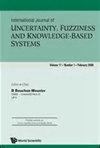Analysis on Prediction of Covid-19 with Machine Learning Algorithms
IF 1
4区 计算机科学
Q4 COMPUTER SCIENCE, ARTIFICIAL INTELLIGENCE
International Journal of Uncertainty Fuzziness and Knowledge-Based Systems
Pub Date : 2022-04-11
DOI:10.1142/s0218488522400049
引用次数: 1
Abstract
During the pandemic, the most significant reason for the deep concern for COVID-19 is that it spreads from individual to individual through contact or by staying close with the diseased individual. COVID-19 has been understood as an overall pandemic, and a couple of assessments is being performed using various numerical models. Machine Learning (ML) is commonly used in every field. Forecasting systems based on ML have shown their importance in interpreting perioperative effects to accelerate decision-making in the potential course of action. ML models have been used for long to define and prioritize adverse threat variables in several technology domains. To manage forecasting challenges, many prediction approaches have been used extensively. The paper shows the ability of ML models to estimate the amount of forthcoming COVID-19 victims that is now considered a serious threat to civilization. COVID-19 describes the comparative study on ML algorithms for predicting COVID-19, depicts the data to be predicted, and analyses the attributes of COVID-19 cases in different places. It gives an underlying benchmark to exhibit the capability of ML models for future examination.基于机器学习算法的Covid-19预测分析
在大流行期间,COVID-19引起深切关注的最重要原因是,它通过接触或与患病个体密切接触在人与人之间传播。COVID-19已被理解为一场全面的大流行,目前正在使用各种数值模型进行一些评估。机器学习(ML)广泛应用于各个领域。基于机器学习的预测系统在解释围手术期影响以加速潜在行动过程中的决策方面显示出其重要性。长期以来,机器学习模型一直被用于定义和优先考虑几个技术领域中的不利威胁变量。为了应对预测挑战,许多预测方法被广泛使用。该论文展示了ML模型估计即将到来的COVID-19受害者数量的能力,这些受害者现在被认为是对文明的严重威胁。COVID-19描述了预测COVID-19的ML算法的比较研究,描述了需要预测的数据,分析了不同地区COVID-19病例的属性。它提供了一个基础基准来展示ML模型的能力,以供将来的检查。
本文章由计算机程序翻译,如有差异,请以英文原文为准。
求助全文
约1分钟内获得全文
求助全文
来源期刊
CiteScore
2.70
自引率
0.00%
发文量
48
审稿时长
13.5 months
期刊介绍:
The International Journal of Uncertainty, Fuzziness and Knowledge-Based Systems is a forum for research on various methodologies for the management of imprecise, vague, uncertain or incomplete information. The aim of the journal is to promote theoretical or methodological works dealing with all kinds of methods to represent and manipulate imperfectly described pieces of knowledge, excluding results on pure mathematics or simple applications of existing theoretical results. It is published bimonthly, with worldwide distribution to researchers, engineers, decision-makers, and educators.

 求助内容:
求助内容: 应助结果提醒方式:
应助结果提醒方式:


